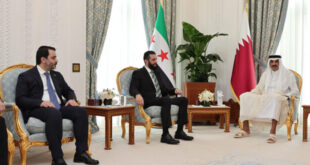Aleppo, SANA- Minister of Economy and Industry Dr. Mohammad Nidal al-Shaar and Aleppo governor, Azzam al-Gharib discussed the challenges facing the commercial and industrial sectors, ways to boost the national economy, and the development of practical plans to overcome the accumulated crises.
The meeting with economic and industrial activists in the province, which included representatives of the Chambers of Commerce and Industry and businessmen, focused on a number of fundamental issues.
The activists called for activating direct dialogue between government agencies and the private sector, moving away from the bureaucratic methods followed by the deposed regime.
It was also recommended imposing high customs duties on imported goods and combating smuggling to ensure fair competition for local industries.
They also recommended addressing the disparity in energy prices between Aleppo governorate and the northern regions of Syria, which constitutes a burden on industrial facilities.
The discussion also included a call to strengthen vocational training programs, link them to the labor market, and support scientific research to fill the shortage of trained workers. It also called for the rehabilitation of the textile and footwear sectors, which were systematically destroyed due to the policies of the former regime.
Activists also called for removing obstacles to obtaining raw materials not produced locally and suggested boosting communication with airlines and foreign traders to activate the role of Aleppo Airport, stimulate exports, and attract investment.
In a statement to a SANA reporter, minister of Economy and Industry said that “economic decision-making will be collaborative with all parties,” and noted the importance of reviewing and revising previous government decisions in cooperation with experts.
“Syria possesses the human and scientific capabilities, and everyone must work to serve the national economy and protect our products.”he added.
For his part, governor of Aleppo stressed “the importance of cooperation between the government and economic actors to develop practical solutions,” considering that “relying on collective opinion is the best way to relaunch the wheel of production.”.
The meeting embodies the government’s commitment to adopting a new approach based on transparency and partnership in an effort to compensate for years of marginalization that have debilitated productive sectors.
MHD Ibrahim
 Syrian Arab News Agency S A N A
Syrian Arab News Agency S A N A

